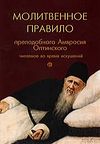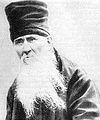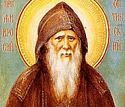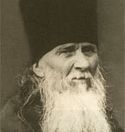 Holy Apostle Philip of the Seventy, one of the seven deacons (1st c.).
Holy Apostle Philip of the Seventy, one of the seven deacons (1st c.).  St. Theophanes Graptus (“the Branded”), confessor and hymnographer, bishop of Nicaea (850). Synaxis of the Elders of Optina: Sts. Leonid (repose) (1841), Macarius (1860), Moses (1862), Anthony (1865), Hilarion (1873), Ambrose (1891), Anatole I (1894), Isaac I (1894), Joseph (1911), Barsanuphius (1913), Anatole II (1922), Nektary (1928), New Hiero-confessor Nikon (1931), and New Hieromartyr Archimandrite Isaac II (1937).
St. Theophanes Graptus (“the Branded”), confessor and hymnographer, bishop of Nicaea (850). Synaxis of the Elders of Optina: Sts. Leonid (repose) (1841), Macarius (1860), Moses (1862), Anthony (1865), Hilarion (1873), Ambrose (1891), Anatole I (1894), Isaac I (1894), Joseph (1911), Barsanuphius (1913), Anatole II (1922), Nektary (1928), New Hiero-confessor Nikon (1931), and New Hieromartyr Archimandrite Isaac II (1937).
Martyrs Zenaida (Zenais) and Philonilla, of Tarsus in Cilicia (1st c.). St. Theophanes, faster, of the Kiev Caves (12th c.).
New Hieromartyr Juvenal (Maslovsky), archbishop of Ryazan and Shatzk (1937).
Sts. Nectarius (397), Arsacius (405), and Sinisius (427), archbishops of Constantinople. St. Cainnech (Kenneth), abbot, of Aghaboe (Ireland), and missionary in Scotland (600). St. Ethelburga, foundress of the monastery of Barking (England) (ca. 676). St. Gommar, patron of Lier (Neth.) (775). Commemoration of the Miracle from the Icon of Our Lord Jesus Christ in Beirut of Phoenicia (7th c.). St. Sabbas, fool-for- Christ, of Vatopedi, Mt. Athos (1349). St. Philotheus (Kokkinos) of Mt. Athos, patriarch of Constantinople (1379).
Tuesday. [Col. 1:1-2, 7-11; Luke 8:1-3]
The Lord preaches, the women serve Him
from their substance, and are thus as participants in his
very preaching. It is not given to everyone to preach the
Gospels, but everyone can help spread them, and be
participants in this most important matter on the earth.
There were many such participants, both men and women, at
the time the holy apostles preached; and then at the time
of their successors, and finally, throughout the entire
history of the Church. Such participants exist to this
day. Our apostles in the Caucasus and in various areas of
Siberia labour zealously, suffering every need and
deprivation. They continue the work of the Lord and the
holy Apostles. Those men and women who send them help join
the ranks of the women who served the Lord, and become
worthy of equal recompense. The Lord said: He that
receiveth whomsoever I send receiveth Me (John 13:20).
This means that He equates Himself with the one who is
sent to preach; it would follow that He equates the
service rendered to his messengers with serving Him.
According to the law of His goodness and truth, the way a
person receives one determines the reward he will receive
(Matt. 10:41). This would seem to be sufficient incentive
to keep giving alms to help in the great work of preaching
of the Gospels.


![]() Holy Apostle Philip of the Seventy, one of the seven deacons (1st c.).
Holy Apostle Philip of the Seventy, one of the seven deacons (1st c.). ![]() St. Theophanes Graptus (“the Branded”), confessor and hymnographer, bishop of Nicaea (850). Synaxis of the Elders of Optina: Sts. Leonid (repose) (1841), Macarius (1860), Moses (1862), Anthony (1865), Hilarion (1873), Ambrose (1891), Anatole I (1894), Isaac I (1894), Joseph (1911), Barsanuphius (1913), Anatole II (1922), Nektary (1928), New Hiero-confessor Nikon (1931), and New Hieromartyr Archimandrite Isaac II (1937).
St. Theophanes Graptus (“the Branded”), confessor and hymnographer, bishop of Nicaea (850). Synaxis of the Elders of Optina: Sts. Leonid (repose) (1841), Macarius (1860), Moses (1862), Anthony (1865), Hilarion (1873), Ambrose (1891), Anatole I (1894), Isaac I (1894), Joseph (1911), Barsanuphius (1913), Anatole II (1922), Nektary (1928), New Hiero-confessor Nikon (1931), and New Hieromartyr Archimandrite Isaac II (1937). 


































